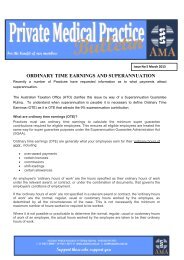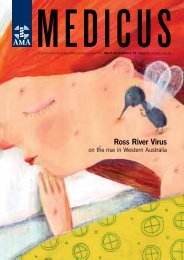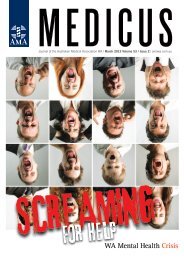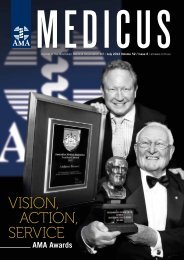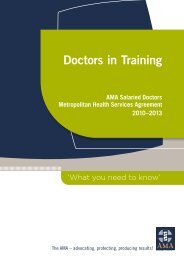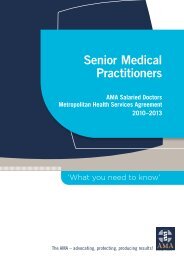twrama 1990_final oc.. - AMA WA
twrama 1990_final oc.. - AMA WA
twrama 1990_final oc.. - AMA WA
Create successful ePaper yourself
Turn your PDF publications into a flip-book with our unique Google optimized e-Paper software.
HIGHER RISK OF COMPLAINTS AGAINST SOME<br />
INTERNATIONAL MEDICAL GRADUATES<br />
I<br />
nternational medical graduates are more likely than their Australian-trained counterparts to have complaints made against<br />
them to medical boards and receive adverse disciplinary findings, according to a study published in the Medical Journal of<br />
Australia.<br />
However, the results differed markedly by overseas country of training, according to the lead author Katie Elkin and leader<br />
of the research group Professor David Studdert, from the School of Population Health and Law School at the University of<br />
Melbourne, and their co-author.<br />
The researchers found that d<strong>oc</strong>tors who qualified in Nigeria, Egypt, Poland, Russia, Pakistan, the Philippines and India<br />
had higher odds of complaints than Australian-trained d<strong>oc</strong>tors.<br />
The numbers of international medical graduates (IMGs) in Australian clinical practice have grown and now account for<br />
nearly 25 per cent of d<strong>oc</strong>tors in this country. According to the authors, some high-profile cases featuring incompetent IMGs<br />
have ignited public concerns, but there is very little hard evidence about whether the quality of care delivered by this large<br />
section of our national medical workforce is better or worse.<br />
The researchers analysed over 5000 complaints resolved by the medical boards in Victoria and Western Australia between<br />
2001 and 2010 and found that overall, IMGs had 24 per cent higher odds of attracting complaints than Australian-trained<br />
d<strong>oc</strong>tors, and 41 per cent higher odds of having adverse disciplinary findings made against them.<br />
The big differences were among IMGs themselves. For example, complaint rates against d<strong>oc</strong>tors trained in some countries<br />
were more than five times greater than complaint rates against d<strong>oc</strong>tors trained in other countries.<br />
Despite having relatively high complaint rates, the contribution of IMGs from some countries to total complaints in<br />
Victoria and Western Australia was small, the authors wrote. The authors added more research was needed to uncover the<br />
reasons for the inter-country differences.<br />
The data used in the study preceded the move to a national practitioner registration system.<br />
“The recent move to a national registration framework should expand opportunities for research in this area,” they wrote.<br />
“Findings from this study should provoke and inform discussion about more sophisticated approaches to regulating<br />
IMGs”, the researchers concluded.<br />
In an accompanying editorial published in the same issue of the MJA, Professor Balakrishnan Nair and his co-author,<br />
from the Centre for Continuing Medical Professional Development at John Hunter Hospital, Newcastle, wrote that the report<br />
highlighted “the need for a proactive and tailored approach in assessing, mentoring and supporting IMGs, which, in turn, will<br />
improve patient care”.<br />
According to the authors, an unpublished survey conducted by their centre showed that, of 243 IMGs, one-quarter<br />
reported receiving no formal orientation and fewer than half received orientation lasting less than one day.<br />
“Instead of setting IMGs up to fail, we should be doing everything to set them up to succeed. If IMGs fail, both the<br />
Australian community and the medical profession will suffer,” they wrote.<br />
SNIPPET<br />
AUSTRALIA’S FIRST LIVER–INTESTINAL TRANSPLANT<br />
HAILED A SUCCESS<br />
Australia’s first intestinal transplant recipient remains well two years after his operation who described the breakthrough<br />
pr<strong>oc</strong>edure in detail in the Medical Journal of Australia. Dr Mayur Garg and Dr Adam Testro, gastroenterologists with<br />
the Liver Transplant Unit at Austin Hospital, and their co-authors described how a team of 20 surgeons, anaesthetists and<br />
theatre staff performed the operation.<br />
Austin Hospital and Royal Children’s Hospital in Victoria recently joined the ranks of 35 centres worldwide that are<br />
equipped to perform this pr<strong>oc</strong>edure, which can save the lives of patients with irreversible intestinal failure.<br />
The 32-year-old recipient had experienced bowel dysfunction since birth and had had multiple operations by the age of 18<br />
years. Since the operation, his psychological well-being and quality of life had improved markedly. He is now able to eat and<br />
has returned to full-time work for the first time in 14 years.<br />
According to the authors, there have been enormous advances in immunosuppression prot<strong>oc</strong>ols, surgical technique and<br />
post-operative care since the first human intestinal transplant was performed three decades ago. Figures now show five-year<br />
survival rates of more than 50 per cent for intestinal transplants performed between 2006 and 2011.<br />
Prior to the establishment of this service, Australians who needed this operation either succumbed to their condition or<br />
had to travel overseas at great financial and psychos<strong>oc</strong>ial expense, said Ass<strong>oc</strong>iate Professor Simone Strasser, a senior staff<br />
specialist at AW Morrow Gastroenterology and Liver Centre, Royal Prince Alfred Hospital, in an editorial in the same issue<br />
of the MJA.<br />
However, medical advances such as intestinal transplant would be stymied unless organ donation rates improved, she<br />
wrote.<br />
“We must have an effective and sustained improvement in organ donation rates to bring Australia in line with countries in<br />
North America and Europe that are able to provide transplantation to two to three times as many patients as we do.”<br />
October MEDICUS 43





